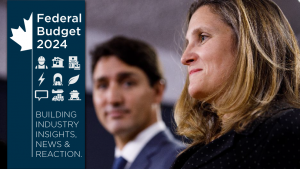A recent report prepared for the Residential and Civil Construction Alliance of Ontario (RCCAO) states holding back on infrastructure investment could exacerbate the effects of the COVID-19 pandemic, result in billions of dollars in lost tax revenue for federal and provincial governments and hamper Ontario’s economic recovery.
Entitled Navigating the COVID-19 Socio-economic Shock: How Infrastructure Investments Will Facilitate Future Growth in Ontario, the report prepared by the Canadian Centre for Economic Analysis (CANCEA), states now is a critical time for the Government of Canada to work with the Ontario government and municipalities to find solutions that address municipal operating deficits while also funding infrastructure projects.
“We’re trying to send the message to the (federal) finance minister that although the debt situation may look dire right now, if you do make these investments, over the longer term you will get more tax revenues and more long-term building of our economic foundation in Canada,” said Andy Manahan, executive director of the RCCAO.
“I would really like to see them thinking about this as a non-political issue. They do need to work together and be more agile.
“If municipalities had a list of projects they thought were ready to tender this year, what a great time to speed that process up right now.”
The operating deficits, caused by the increased need for services and a simultaneous drop in revenue, combined with the expected decline in both provincial and federal GDP due to the economic slowdown, could put Ontario’s planned infrastructure investments at risk while also threatening to limit the financial returns from past infrastructure investments, states the report. This could have long-term implications for growth even post-COVID-19.
There will be no recovery unless municipalities first get the support they need,
— Bill Karsten
Federation of Canadian Municipalities
“If the Ontario and federal governments do not invest the same amount in infrastructure as was planned pre-crisis and the province uses funds from its capital budget to cover municipal deficits, then there will be clear and measurable consequences, namely lower long-term growth, fewer jobs and lower government revenue,” reads the report. “The current once-in-a-generation socio-economic crisis caused by the pandemic will only compound the consequences and significance of this decision.”
In an email to the Daily Commercial News, Federation of Canadian Municipalities (FCM) president Bill Karsten, said municipalities across the country are facing a financial crisis.
“Weeks ago, through FCM, they called for urgent, emergency operating funding to keep essential local services running for Canadians,” Karsten stated. “Municipalities are key economic drivers in this country, and the financial emergency they are facing because of COVID-19 threatens the economic recovery Canadians are counting on. We need to make sure that cities and communities are in a position to deliver needed stimulus at the local level, when it’s time.”
The RCCAO report aligns with FCM’s estimate that in order to cover all municipal operating deficits for 2020, municipalities will need $10 to $15 billion in direct support, he added.
“These conclusions add to the growing chorus of municipal, business and labour leaders calling on federal, provincial and territorial governments to come together to support municipalities, who are on the frontlines of the pandemic,” Karsten stated. “Investing directly in Canada’s communities and local infrastructure projects will help get this country back on its feet, but the fact remains that there will be no recovery unless municipalities first get the support they need to get out of this financial crisis.”
To date, the federal government’s response to municipal operating shortfalls, namely to fast-track $2.2 billion in infrastructure funding through the Gas Tax Fund, is insufficient, the report states.
“If ever there was a time where we needed to do asset management, state of good repair-type projects to keep the economy going, now would be the time,” said Manahan. “The state of good repair is stuff that can be done immediately. It’s typically more labour intensive so it does have more employment benefits right out of the gate.”
In the report, researchers proposed two contrasting risk scenarios for the next 10 and 30 years based on different levels of infrastructure spending.
Under one risk scenario, the federal and Ontario government investment levels are kept at the same percentage of GDP, which existed at pre-crisis levels and municipal operating deficits are paid for out of Ontario’s capital budget. The province would have 55,000 fewer jobs, on average, per year over the next decade, with the federal and provincial governments losing $8 billion and $12 billion, respectively, in revenue. Over the next 30 years, there would be 79,000 fewer jobs on average per year, and the federal and provincial governments would lose $36 billion and $51 billion, respectively.
Under the preferred scenario, where the federal and Ontario governments invest at pre-COVID levels and the federal government covers the majority of municipal operating deficits, Ontario would gain 61,000 jobs on average per year over the next 10 years and the federal and provincial governments would receive $9 billion and $13 billion, respectively, in revenue. Over the next 30 years, there would be a gain of 189,000 jobs on average per year and the federal and provincial governments would gain $86 billion and $123 billion, respectively.
Follow the author on Twitter @DCN_Angela.











Recent Comments
comments for this post are closed